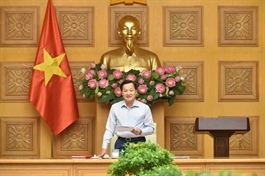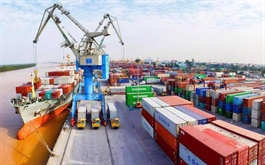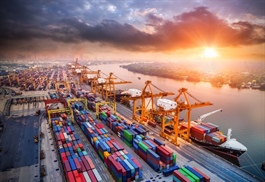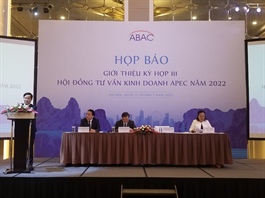Deputy PM sets economic directives amid higher risks
Deputy PM sets economic directives amid higher risks
Although the Vietnamese economy is expected to recover faster in the second half of 2022, various risks still lie ahead, adding uncertainty to the recovery, according to Deputy Prime Minister Le Minh Khai at a recent meeting of the National Financial and Monetary Policy Advisory Council.

The Deputy PM said Viet Nam did well economically in the first half of the year with a growth rate of 6.42 per cent and inflation rate of 2.44 per cent. A stable monetary market, coupled with relatively low interest rates, made it possible to expand credit to firms, quickly getting the economy back on track.
Economic growth is forecast to accelerate in the rest of the year, but against a backdrop of higher inflationary pressure fueled by mounting petrol and material prices and a possible downturn of the global economy. These unfavourable factors will be posing great risks to the recovery, exposing the need for drastic actions.
"Monetary and fiscal policies in the second half of the year should be closely aligned with the goal of economic stability, low inflation and the balance of the economy as a whole. Specifically, it is essential to properly implement fiscal policies, speed up the disbursement of public money and step up the Programme of Social-Economic Recovery," he said.
The Deputy PM called on relevant agencies to keep a close watch on the domestic, regional and international situation, particularly on global inflation and the prices of key materials, to factor potential risks into policy scenarios.
He urged the State Bank of Vietnam (SBV) to use flexible monetary policies, in combination with fiscal policies and other types of policies, to curb inflation. At the same time, SBV is also urged to encourage commercial banks to make more preferential loans to borrowers and to fast-track digital transformation.
Regarding credit limits imposed on commercial banks, he said the caps on bank loans are needed to keep the banks in safe zones. It is important to expand credit to firms to promote economic recovery, but it is also equally important to keep credit risks in check.
He asked the Ministry of Finance and the central bank to continue to develop the securities market, bond market and monetary market into safe and robust markets to enhance financial stability.
He called for more tax cuts, besides the environmental tax cut on fuels, to support individuals and firms. The tax cuts should be carefully studied beforehand to produce the desired effects on the economy.
Lastly, he assigned the Ministry of Industry and Trade the task of market supervision, particularly the fuel market, to ensure supply-demand balance and price stability.
At the meeting, experts forecast that the global economy would turn more volatile in the short term with high inflation rates. In the long term, cheap commodities would be a thing of the past and many supply chains collapse due to the fragmentation of the global economy.
However, the outlook is not that pessimistic for Viet Nam as the country's goods and services are indispensable to the world which has been struggling to get itself out of the downturn.
Experts called for cautious monetary policies with high flexibility to continue to tame domestic inflation. They said inflationary pressure is being fueled not only by cost-push factors, but also demand-pull factors and the disruption of global supply chains, so Viet Nam should always remain vigilant.






















